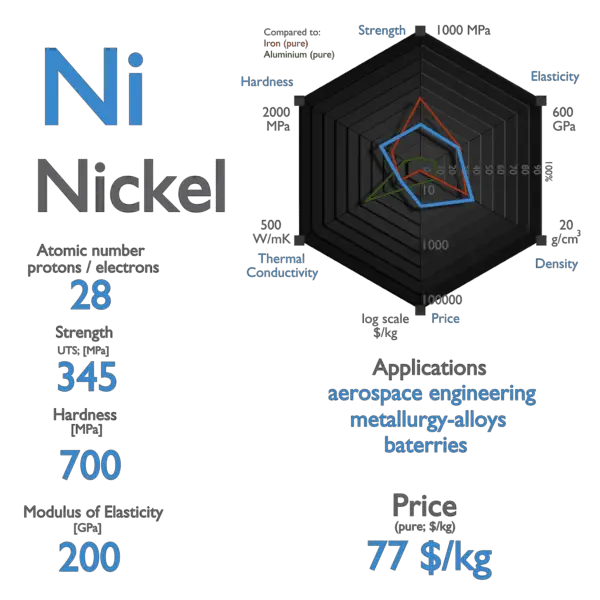Unveiling the Strength and Versatility of this Exceptional Metal
Nickel, a versatile and robust metal, boasts an impressive array of properties that have made it an essential component in various industries. In this article, we’ll explore the remarkable properties of nickel and delve into some of the most important alloys derived from this exceptional element.
Discover Fascinating Facts about Nickel
Nickel, symbolized as Ni and atomic number 28, is an abundant chemical element found in the Earth’s crust. It constitutes about 0.008% of the crust’s composition, making it one of the most abundant elements.

Properties, History, and Diverse Applications
Nickel, a versatile and valuable metal, plays a crucial role in numerous industries due to its unique combination of properties.

The Exceptional Properties of Nickel
Nickel, known by its symbol Ni on the periodic table, is a metal that stands out for its unique combination of characteristics, making it invaluable in various applications.
- Nickel is a silvery-white, hard, malleable, and ductile metal
- It is a good conductor of heat and electricity
- It is bivalent, meaning it has a valency of two
- The metal dissolves slowly in dilute acid
- Its melting point is 1453 째C, and its boiling point is 2913 째C
1. Hardness and Ductility
Nickel is renowned for its hardness, which makes it suitable for a range of demanding environments. However, it also possesses ductility, allowing it to be shaped and molded without losing its structural integrity. This property is particularly important in industries where both strength and flexibility are required.
2. Ferromagnetism
One of nickel’s most fascinating properties is its ferromagnetic nature. It exhibits strong magnetic properties, making it a key component in the production of magnets, especially when alloyed with other metals like iron and cobalt.
3. High Resistance to Corrosion
Nickel is highly resistant to atmospheric corrosion, which means it can withstand exposure to moisture and air without deteriorating. This property makes it an excellent choice for protective coatings on various surfaces.
4. Electrical and Thermal Conductivity
While not as conductive as copper, nickel still possesses fair electrical and thermal conductivity. This makes it valuable in electrical applications where both corrosion resistance and conductivity are required.
Alloys Derived from Nickel
Nickel’s exceptional properties make it an ideal candidate for alloying with other metals. Here are some of the most important nickel-based alloys and their applications:
1. Stainless Steel
Stainless steel, a widely used material in construction, kitchenware, and more, often contains nickel. The addition of nickel enhances the alloy’s resistance to corrosion and staining, making it a durable and attractive choice.
2. Monel
Monel is a group of nickel-copper alloys known for their exceptional resistance to corrosion. They find applications in marine environments, chemical processing, and aerospace due to their robustness.
3. Inconel
Inconel alloys, which contain nickel and chromium, are prized for their high-temperature strength and corrosion resistance. They are used in aerospace, gas turbine engines, and various high-temperature applications.
4. Nichrome
Nichrome alloys, composed of nickel and chromium, are widely used for their electrical resistance properties. They serve as heating elements in appliances like toasters and hairdryers.
5. Permalloy
Permalloy is a nickel-iron alloy known for its high magnetic permeability and low hysteresis loss. It’s utilized in applications where precise control of electromagnetic properties is crucial, such as transformers and inductors.
Nickel, with its impressive set of properties, plays a pivotal role in diverse industries. Its combination of hardness, ductility, magnetic properties, and corrosion resistance makes it a versatile and sought-after material. When alloyed with other metals, it gives rise to a range of materials that excel in specific applications, from stainless steel’s corrosion resistance to Inconel’s high-temperature strength.
As technology continues to advance, nickel and its alloys will remain indispensable, contributing to innovations across numerous fields.


